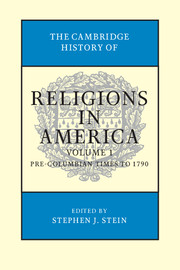Book contents
- Frontmatter
- Contents
- Contributors
- Editor's Introduction
- SECTION I BACKGROUND ON RELIGIOUS TRADITIONS – PRE-1500S
- SECTION II RELIGIONS IN THE POST-COLUMBIAN NEW WORLD – 1500–1680S
- SECTION III RELIGIOUS PATTERNS IN COLONIAL AMERICA – 1680S–1730S
- SECTION IV RELIGIOUS DIVERSITY IN BRITISH AMERICA – 1730S–1790
- 17 Religious Ferment among Eastern Algonquians and Their Neighbors in the Eighteenth Century
- 18 African Slave Religions, 1400–1790
- 19 Colonial Judaism
- 20 Roman Catholicism in the English North American Colonies, 1634–1776
- 21 Anglicanism and Its Discontents: Protestant Diversity and Disestablishment in British America
- 22 Protestant Evangelicalism in Eighteenth-Century America
- 23 Sectarian Communities: Religious Diversity in British America, 1730–1790
- 24 Liberal Religious Movements and the Enlightenment
- 25 Folk Magic and Religion in British North America
- SECTION V AMERICAN RELIGIONS IN THE EIGHTEENTH-CENTURY INTERNATIONAL CONTEXT
- SECTION VI THEMATIC ESSAYS
- Index
- References
25 - Folk Magic and Religion in British North America
from SECTION IV - RELIGIOUS DIVERSITY IN BRITISH AMERICA – 1730S–1790
Published online by Cambridge University Press: 28 July 2012
- Frontmatter
- Contents
- Contributors
- Editor's Introduction
- SECTION I BACKGROUND ON RELIGIOUS TRADITIONS – PRE-1500S
- SECTION II RELIGIONS IN THE POST-COLUMBIAN NEW WORLD – 1500–1680S
- SECTION III RELIGIOUS PATTERNS IN COLONIAL AMERICA – 1680S–1730S
- SECTION IV RELIGIOUS DIVERSITY IN BRITISH AMERICA – 1730S–1790
- 17 Religious Ferment among Eastern Algonquians and Their Neighbors in the Eighteenth Century
- 18 African Slave Religions, 1400–1790
- 19 Colonial Judaism
- 20 Roman Catholicism in the English North American Colonies, 1634–1776
- 21 Anglicanism and Its Discontents: Protestant Diversity and Disestablishment in British America
- 22 Protestant Evangelicalism in Eighteenth-Century America
- 23 Sectarian Communities: Religious Diversity in British America, 1730–1790
- 24 Liberal Religious Movements and the Enlightenment
- 25 Folk Magic and Religion in British North America
- SECTION V AMERICAN RELIGIONS IN THE EIGHTEENTH-CENTURY INTERNATIONAL CONTEXT
- SECTION VI THEMATIC ESSAYS
- Index
- References
Summary
When several girls and young women living in Salem Village, Massachusetts, began to have strange fits in January 1692, their worried families and neighbors wanted to know what was causing the afflictions and how to end them. Two of the girls lived in the household of Samuel Parris, the minister in Salem Village: his daughter, Elizabeth Parris, and his niece, Abigail Williams. Parris responded to the situation by calling in the local physician, William Griggs, so as to establish whether the afflictions had a “natural” cause. But the doctor told Parris that he could do nothing for them: they were, he declared, “under an evil hand.” Parris then consulted with fellow ministers from neighboring communities, who agreed with Griggs that the fits were “preternatural.” They advised Parris to “sit still and wait upon the Providence of God to see what time might discover; and to be much in prayer for the discovery of what was yet secret.”
Yet not all villagers were willing to wait on “the Providence of God” to reveal the cause of the fits. Mary Sibley, a member of the local church and the aunt of another afflicted girl, Mary Walcott, suspected that her niece was bewitched and turned to countermagic in an attempt to cure her. Sibley asked two Indian slaves who lived and worked in the minister's home, Tituba and John, to bake a cake consisting of meal and the afflicted girl's urine, which they then fed to a dog.
- Type
- Chapter
- Information
- The Cambridge History of Religions in America , pp. 510 - 528Publisher: Cambridge University PressPrint publication year: 2000



